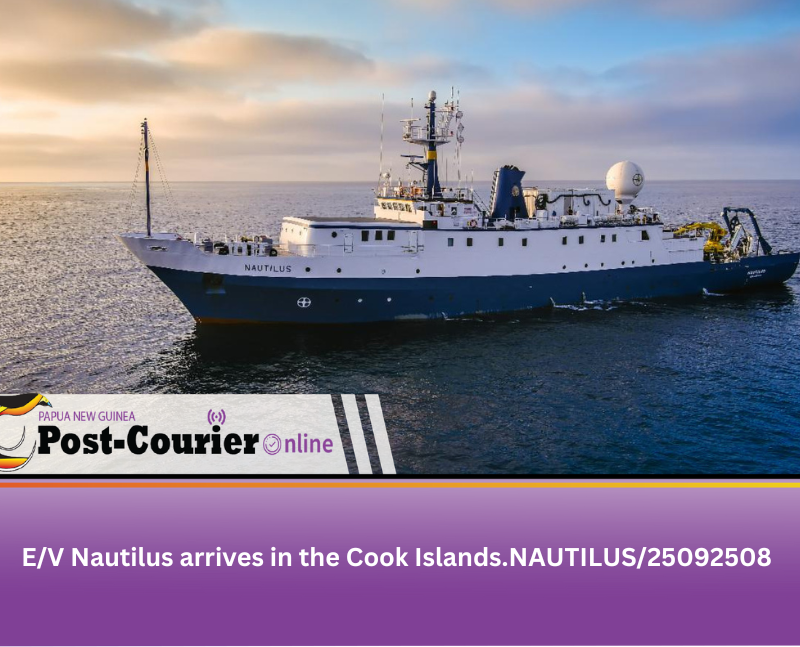By Noaa Ocean Exploration,postcourieronline
Copyright postcourier

On Friday, the exploration vessel (E/V) Nautilus arrives in the Cook Islands for the first time. Owned and operated by the U.S-based non-profit organisation Ocean Exploration Trust (OET), the 68-meter vessel specialises in scientific exploration of the deep ocean alongside education and outreach for global audiences.
The ship arrived in preparation for the Deep-Sea Habitats of the Cook Islands expedition, supported by the U.S National Oceanic and Atmospheric Administration (NOAA), launching on 01 October. Aboard Nautilus, an international team will spend 21 days exploring deep-sea areas prioritised by scientific experts, the Cook Islands government, and local stakeholder input. The focus will be on scientific imaging and cataloging the seabed and biological diversity to provide information needed to support the management of marine resources in the region.
The expedition is supported by NOAA Ocean Exploration via the Ocean Exploration Cooperative Institute, in partnership with OET and the Cook Islands Seabed Minerals Authority. The expedition team includes six local participants from the Cook Islands.
“The governments of the United States and the Cook Islands recently agreed to work together to gather important data from the deep seas of the Cook Islands in order to increase understanding of these waters, which include a vast region enriched in marine critical minerals,” said Dr Aurora Elmore, a NOAA marine geologist and co-lead scientist for the expedition. “NOAA is thrilled to be able to bring this research expedition with advanced technologies to assist this important international partnership.”
“This expedition is about learning more about our Marae Moana — not exploitation, but understanding,” said Beverly Stacey-Ataera, Commissioner of the Seabed Minerals Authority. “By working with partners like NOAA and OET, Cook Islanders gain knowledge, skills, and data that strengthen our ability to conserve and manage our ocean for generations to come.”
“This expedition is about learning more about our Marae Moana and its seabed,” said Beverly Ataera, SBM Commissioner of the Seabed Minerals Authority. “SBMA is privileged to work with a wide range of expert partners like NOAA and OET. Engagements over the last few years have seen Cook Islanders gain knowledge, skills, and data that strengthen our ability to conserve and manage our ocean for generations to come.”
This scientific effort is focused on improving understanding of seabed environments. While at sea, the team will deploy OET’s mapping, telepresence, and remotely operated vehicle systems from E/V Nautilus to collect high-resolution visual observations of the seafloor, as well as environmental data and physical samples, to support studies on the biodiversity and geological context in abyssal plain habitats and the Manihiki Plateau.
“We are excited to bring Nautilus to the Cook Islands for the first time, working alongside local partners to conduct science-based exploration of the deep sea,” said Allison Fundis, OET’s Chief Operating Officer. “By openly sharing the data and streaming the expedition live, we aim to grow knowledge and support Cook Islanders in stewarding their ocean.”
All data will be made publicly available, helping support ongoing local management and future decision-making by Cook Islanders. Additionally, the expedition will be streamed live on NautilusLive.org, a 24-hour platform that brings ocean exploration directly to viewers on shore. Telepresence technology invites Cook Islands communities and global audiences to engage with the team at sea, asking questions and receiving real-time behind-the-scenes updates via social media. Classrooms worldwide are invited to connect with the at-sea team via free educational Q&A interactions.
The upcoming expedition is part of an exciting 2025 field season wherein seven expeditions across the Pacific have built ocean knowledge and supported international scientific and U.S governmental priorities, particularly understanding the deep sea, sharing that knowledge with others, and contributing new discoveries and data to inform future resource management decisions…. PACNEWS



